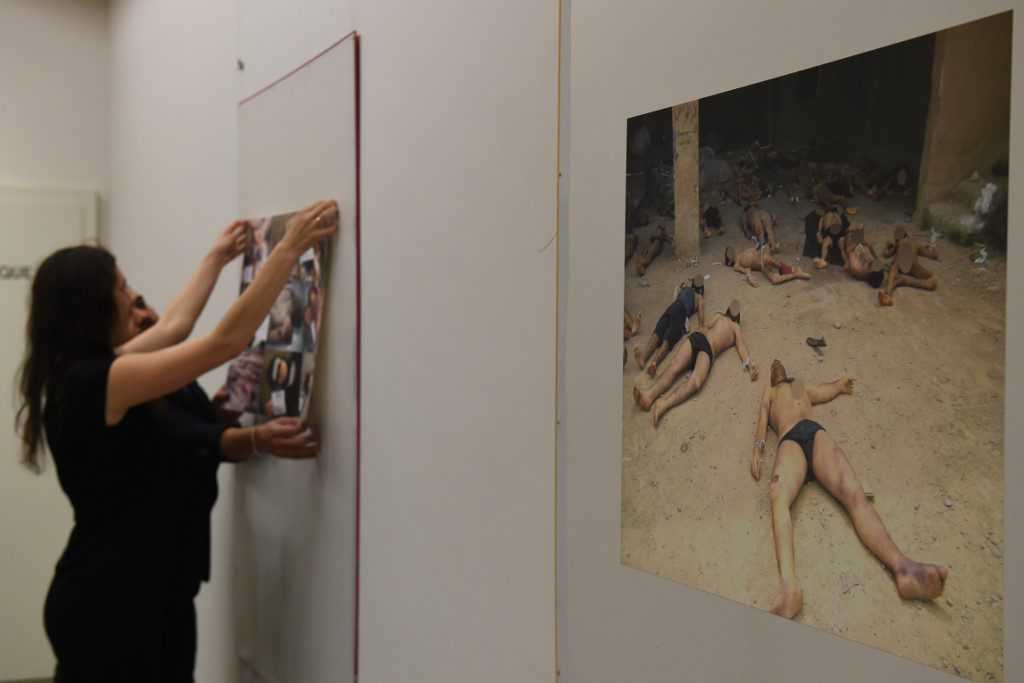What does the Netherlands’ attempt to hold the Syrian government accountable for human rights violations mean?
In a bid to crack the climate of impunity, the Netherlands seeks to bring Syria to the world’s top judicial organ.
22 September 2020
Members of the Syrian Organisation for the Victims of War (SOVW) display in Geneva pictures documenting the torture of detainees inside the Assad regime’s prisons and detention centres, 17/3/2016 (AFP)
BEIRUT– Last week, the Netherlands announced that it will hold Syria responsible for gross human rights violations in front of an international court.
For the last nine years, human rights organizations have widely documented torture, enforced disappearances and attacks on civilians committed by the Syrian government.
But the path towards holding the Syrian government accountable has stumbled upon geopolitical interests. Damascus has been sheltered by Russia and China’s vetoes at the UN Security Council (UNSC), preventing the referral of the ‘Syrian case’ to the International Criminal Court (ICC) and hindering the creation of an ad hoc tribunal like the ones that tried international crimes in Yugoslavia and Rwanda.
Now, in a bid to crack this climate of impunity, the Netherlands seeks to bring Syria to the world’s top judicial organ.
What did the Netherlands do?
- On September 18, the Dutch Minister of Foreign Affairs, Stef Blok, sent a diplomatic note to his Syrian counterparts holding Syria responsible under international law for gross human rights violations and torture in particular.
- The Dutch argue that the Syrian government has breached its obligations to the UN Convention Against Torture (UNCAT) – ratified by Damascus in 2004 – and is seeking to bring Syria in front of an international tribunal, most probably the International Court of Justice (ICJ).
- From March 2011 until June 2020, 14,235 deaths under torture have been documented in Syrian detention centers, according to the Syrian Network of Human Rights.
What are the steps to bring Syria to the ICJ?
- The Netherlands has asked Syria to enter negotiations over the alleged violations of the UNCAT.
- If the parties do not settle, Dutch authorities can submit the case to arbitration.
- If the arbitration does not result in a final decision, the Netherlands can submit the case to an international court.
It remains to be seen how the case develops but this attempt puts a spotlight on the violations committed by the Syrian government, muddying the voices arguing for normalization with Damascus now that it controls two-thirds of the country.
What is the difference between the ICJ and ICC?
- The International Court of Justice is the U.N.’s court for disputes between states, and it does not prosecute individuals. It deals with breaches of UN treaties, such as the UNCAT.
- The International Criminal Court, created in 2002 by the Rome Statute, prosecutes individuals for war crimes, crimes against humanity, genocide and crimes of aggression. If national courts are unable or unwilling to investigate a crime, the case can be referred to the ICC by the UNSC, but this option has been vetoed by Russia and China. In addition, Syria has not ratified the Rome Statute, so the ICC has virtually no jurisdiction to try crimes committed in Syrian territory. Some lawyers, though, have tried to counter-argue that point:
- In March 2019, human rights lawyers – on behalf of 28 Syrian refugees in Jordan – called the ICC to exercise jurisdiction over deportations from Syria to Jordan (ICC member) and try Bashar al-Assad for crimes against humanity. Their plight was based on an ICC ruling on the Rohingya persecution – Myanmar is not an ICC member, but Bangladesh is, so the ICC found that part of the crime was committed in Bangladesh and thus had jurisdiction.
The tumultuous path towards accountability
- August 2011. Creation of the Independent International Commission of Inquiry on the Syrian Arab Republic (CoI). Its mandate is to investigate human rights violations in Syria.
- February 2013. The CoI states that the ICC is an adequate venue to pursue the fight against impunity in Syria.
- January 2014. Military defector codenamed ‘Caesar’ smuggles out 28,000 photos of torture and death in government detention centers.
- May 2014. Russia and China veto a UNSC resolution that would have referred the situation in Syria to the International Criminal Court.
- December 2016. Creation of the International, Impartial, and Independent Mechanism. Although it cannot prosecute, its goal is to gather evidence of crimes under international law so they can be useful for other tribunals with the jurisdiction (like European courts building cases via extraterritorial jurisdiction).
Mapping attempts to hold Syrian officials accountable for human rights violations
Given the routine vetoes of Russia and China at the UN Security Council (UNSC) that prevent the referral of the Syrian case to the International Criminal Court (ICC) and hinder the creation of a special international tribunal, victims of the crimes committed by the Syrian government are finding a ray of hope in national courts. Under the principle of extraterritorial jurisdiction – the exercise of legal power beyond territorial borders – several European countries, namely France and Germany, are sitting Syrian officials in court. Here is a timeline of the most relevant cases:







